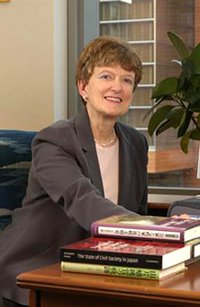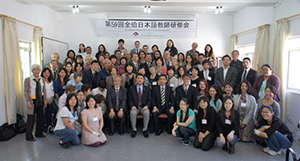The Japan Foundation Awards (2016)
- The Japan Foundation Awards
- The Japan Foundation Awards 2016 Commemorative Lectures
- The Japan Foundation Awards Recipients, Presentation Ceremony and Commemorative Events in Previous Years
Cai Guo-Qiang (Artist) [China]

Cai Guo-Qiang, Qatar, 2016. Photo courtesy of Wen-you Cai, Cai Studio
Cai Guo-Qiang is a world-renowned artist who was born in China and whose talent blossomed in Japan.
Born in Quanzhou in the Fujian Province of China, a city that prospered through the East-West trade route known as the “Maritime Silk Road,” Cai Guo-Qiang started living in Japan in 1986 and established his “gunpowder drawing” technique that creates artwork by detonating gunpowder. This technique stems from his Eastern world view that is connected to his hometown memories. He has continued his dialog with the world through numerous exhibits and projects across the globe using gunpowder, a substance normally used as a destructive weapon, instead used as a medium for expression.
After moving to New York in 1995, he began to expand his activities throughout the world. In 1999, he won the Golden Lion at the Venice Biennale, and in 2008, he served as the Director of Visual and Special Effects for the opening and closing ceremonies of the 2008 Beijing Olympic Games. In the series Projects for Extraterrestrials which began in the 1980s, he attempted to effortlessly overcome terrestrial barriers and conflicts by observing humanity from space. In recent years, he has expanded his activities not only to Europe, but also to locations such as Egypt, Brazil, Qatar, and Australia. In each country, he has carried out large-scale projects under themes such as the universe and nature by digging deep into the location’s history and working together with the local populace.
In Japan, he has continued to support the Iwaki Manbon Sakura Project since the Great East Japan Earthquake of 2011, and has participated in a special exhibition at the Echigo-Tsumari Satoyama Museum of Contemporary Art. In 2015, he presented his “gunpowder paintings” in colors at the large-scale solo exhibition held at the Yokohama Museum of Art entitled There and Back Again. For the exhibition, he created major works based on the theme of the Japanese natural environment together with students and residents of Yokohama.
Cai Guo-Qiang’s artistic efforts are themselves acts of international exchange, bringing together people of different regions, religions, and languages. Last year’s Yokohama exhibition brought the fruits of his many years of work back to Japan, once again raising awareness of the diversity and connectedness of the world. Cai Guo-Qiang’s many years of contributions to the promotion of international mutual understanding deserve high praise, and we accordingly present him with the Japan Foundation Award and look forward to his future endeavors.
Supported by Japan Airlines
Susan J. Pharr (Edwin O. Reischauer Professor of Japanese Politics and Director, Program on U.S.-Japan Relations, Weatherhead Center for International Affairs, Harvard University) [U.S.A.]

Susan J. Pharr has been a leader in Japanese studies in the United States for many years. After receiving her doctorate in political science from Columbia University in 1975, she held positions at the Social Science Research Council, University of Wisconsin-Madison, and the Center for Strategic and International Studies. Joining the Harvard faculty in 1987, she became the Reischauer Professor of Japanese Politics in 1991. She has served as Director, Program on U.S.-Japan Relations, Weatherhead Center for International Affairs, since 1987 and was Director of the Reischauer Institute of Japanese Studies for seven years, until 2011.
Taking an interest in the enactment process of the ground-breaking Japanese constitution, which was formed with the inclusion of women’s suffrage and gender equality, she began her career as a Japanologist by surveying the participation of women in politics in Japan following World War II. She has subsequently expanded her areas of interest to include comparative politics in advanced nations, democratization and social transformation in Japan and East Asia, civil society and non-profit organizations, political ethics and corruption, political science in relation to the environment, the role of media in politics, and participation and leadership by women. Each of these issues is growing in importance today, and she is widely praised for her foresight and her insight into Japanese politics from the standpoint of comparative politics.
As Director, she has organized some 2,000 seminars and symposia to date, and supported the research and studies of some 600 fellows, many of whom today hold leadership positions in academia, the media, business, government, politics, and civil society throughout the world, including Japan and the U.S.
She has also worked to deepen intellectual exchanges between Japan and the U.S. through her service on the Japan-U.S. Friendship Commission; the U.S.-Japan Conference on Cultural and Educational Interchange (CULCON); as an advisor to the “U.S.-Japan Network for the Future” program of the Maureen and Mike Mansfield Foundation, and as a trustee of The Asia Foundation.
Professor Pharr garners great respect for her richly balanced and fair stance of understanding for Japan and for her humble and sincere character.
We award her the Japan Foundation Award in recognition of her notable contributions over many decades to promoting international mutual understanding, particularly between Japan and the U.S.
Supported by Japan Airlines
Centro Brasileiro de Língua Japonesa (CBLJ) [Brazil]

“Omochi tsuki, mochi no gohan ga tondekuru (mochi pounding, rice grains travel through the air).”
This is a haiku by a nine-year-old Brazilian girl who is learning Japanese.
Since the start of Japanese immigration to the country in 1908, Japanese language education in Brazil has developed as a form of language inheritance education for Japanese-Brazilian children. Further, the demand for foreign language education for non-Japanese Brazilians has also been rising due to the popularity of Japanese pop-culture, such as anime, in recent years. However, the fact remains that there are many language learning children at the primary and secondary levels, and roughly 70% of language learners are studying at organizations, such as Japanese language schools run by Japanese Brazilians, other than formal educational institutions.
The Centro Brasileiro de Língua Japonesa (CBLJ) was established in light of the state of Japanese language education in Brazil as the Centro de Difusão da Língua Japonesa in 1985 in São Paulo. The organization has trained over 1,000 Japanese language teachers and supports approximately 20,000 learners annually through its activities that include the training of Japanese language teachers, research and development of learning materials and methods, and international exchange. The organization’s name was changed to the current name in 2003.
As part of its support for language teachers, the CBLJ carries out a wide and diverse array of programs responding to the various needs, including the developing original learning materials for children, cultivating teachers, and training teachers from Central and South American countries.
The organization provides numerous programs for language learners in which children can easily participate, such as competitions in a wide range of areas including pencil and brush calligraphy, painting, comics and anime, and creative writing, as well as Japanese language testing for children. The organization also carries out various motivating activities in an effort to promote international friendship, such as the “Fureai Seminar,” a program for language learner interaction that aims for Japanese language practice, and the “Fureai Nihon no Tabi” program that aims to enable learners to experience the Japanese language and culture.
Through cultivating teachers and supporting learners, the activities of the CBLJ take a central role in Japanese language education not only in Brazil, but in other countries with a high population of descendants of Japanese immigrants, such as Peru, Bolivia, and Paraguay.
In recognition of the contributions of the CBLJ toward promoting international understanding through Japanese Language education, we award them the Japan Foundation Award.
[Contact Us]
The Japan Foundation Communication Center
Tel. +81-(0)3-5369-6075
- What We Do Top
- Arts and Cultural Exchange [Culture]
- Japanese-Language Education Overseas [Language]
- Japanese-Language Education Overseas [Language] Top
- Learn Japanese-language
- Teach Japanese-language
- Take Japanese-Language Test
- Know about Japanese-language education abroad
- The Japanese-Language Institute, Urawa
- The Japanese-Language Institute, Kansai
- Japanese-Language Programs for Foreign Specified Skilled Worker Candidates
- Japanese Language Education for Japanese Children Resident Overseas and for the Descendants of Migrants
- Archives
- Japanese Studies and Global Partnerships [Dialogue]
- JF digital collection
- Other Programs / Programs to Commemorate Exchange Year
- Awards and Prizes
- Publications
